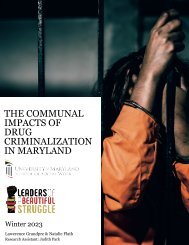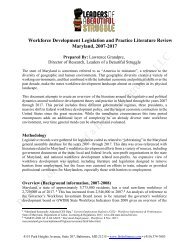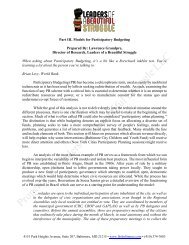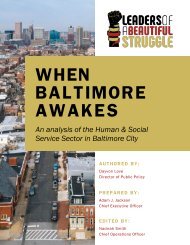Drug Decriminalization in Maryland Through an African Centered Research Paradigm- Analysis and Recommendations
This document offers guidance for theorizing questions related to a proposed research project purposed to advance drug decriminalization in Maryland.
This document offers guidance for theorizing questions related to a proposed research project purposed to advance drug decriminalization in Maryland.
- No tags were found...
Create successful ePaper yourself
Turn your PDF publications into a flip-book with our unique Google optimized e-Paper software.
Part III. <strong>Recommendations</strong> <strong>an</strong>d Suggestions for Future <strong>Research</strong><br />
An import<strong>an</strong>t prerequisite to establish<strong>in</strong>g a research paradigm <strong>an</strong>d strategy to study<br />
decrim<strong>in</strong>alization is to def<strong>in</strong>e the scope <strong>an</strong>d def<strong>in</strong>ition of decrim<strong>in</strong>alization. Jord<strong>an</strong> Blair Woods<br />
uses <strong>an</strong> <strong>an</strong>alysis of the decrim<strong>in</strong>alization of certa<strong>in</strong> traffic offenses to argue that decrim<strong>in</strong>alization<br />
advocates often have a narrow focus on crim<strong>in</strong>al s<strong>an</strong>ctions, fail<strong>in</strong>g to address fundamental<br />
questions of polic<strong>in</strong>g authority. In his conclusion, he offers <strong>an</strong> <strong>in</strong>terest<strong>in</strong>g <strong>an</strong>alysis on how<br />
decrim<strong>in</strong>alization should be evaluated, question<strong>in</strong>g whether “cost benefit <strong>an</strong>alysis” should be the<br />
operative frame for evaluat<strong>in</strong>g decrim<strong>in</strong>alization police, writ<strong>in</strong>g<br />
“It is difficult to propose bright-l<strong>in</strong>e rules or methodologies about when legislative<br />
judgments will weigh <strong>in</strong> favor of restrict<strong>in</strong>g police authority <strong>an</strong>d discretion dur<strong>in</strong>g<br />
decrim<strong>in</strong>alization efforts because of the diversity of contextual factors at play. Limit<strong>in</strong>g<br />
police authority <strong>an</strong>d discretion aga<strong>in</strong>st the backdrop of decrim<strong>in</strong>alized traffic offenses<br />
might be viewed as pos<strong>in</strong>g qualitatively <strong>an</strong>d qu<strong>an</strong>titatively different harms <strong>an</strong>d costs to<br />
civili<strong>an</strong>s <strong>an</strong>d to the state th<strong>an</strong> does restrict<strong>in</strong>g police authority <strong>an</strong>d discretion aga<strong>in</strong>st the<br />
backdrop of other decrim<strong>in</strong>alized offenses. Further, even if a cost-benefit <strong>an</strong>alysis weighs<br />
<strong>in</strong> favor of not restrict<strong>in</strong>g police authority <strong>an</strong>d discretion <strong>in</strong> specific contexts, the extent to<br />
which cost-benefit paradigms should def<strong>in</strong>e the scope of <strong>in</strong>dividual protections (whether<br />
constitutional or statutory) <strong>in</strong> polic<strong>in</strong>g contexts is debatable.398 There may be certa<strong>in</strong><br />
civili<strong>an</strong> harms stemm<strong>in</strong>g from polic<strong>in</strong>g that laws <strong>an</strong>d doctr<strong>in</strong>e should not tolerate or<br />
encourage, even when that approach is viewed as not cost-efficient (especially to the state).<br />
Regardless of methodological choice, approach<strong>in</strong>g decrim<strong>in</strong>alization as a process that<br />
implicates more th<strong>an</strong> crim<strong>in</strong>al s<strong>an</strong>ctions encourages deeper <strong>an</strong>d more systematic<br />
conversations about polic<strong>in</strong>g costs <strong>an</strong>d fairness <strong>in</strong> situations <strong>in</strong>volv<strong>in</strong>g decrim<strong>in</strong>alized<br />
conduct. In focus<strong>in</strong>g on s<strong>an</strong>ctions, narrower accounts of decrim<strong>in</strong>alization do not offer<br />
me<strong>an</strong><strong>in</strong>gful frameworks to evaluate the full scope of these polic<strong>in</strong>g matters, regardless of<br />
whether lawmakers <strong>an</strong>d other crim<strong>in</strong>al justice actors ultimately conclude that they weigh<br />
<strong>in</strong> favor of susta<strong>in</strong><strong>in</strong>g police authority <strong>an</strong>d discretion.” (Woods, 2014).<br />
Even if preserv<strong>in</strong>g some police authority could have some positive effects, Woods offers the<br />
possibility that the potential harm of racialized violence through police traffic stops warr<strong>an</strong>ts a<br />
more comprehensive reduction of police authority through <strong>an</strong> exp<strong>an</strong>ded conception of<br />
decrim<strong>in</strong>alization. He also notes that even after decrim<strong>in</strong>alization, police stops cont<strong>in</strong>ued , as<br />
decrim<strong>in</strong>alization had so deeply focused on whether the driver would receive a crim<strong>in</strong>al or civil<br />
s<strong>an</strong>ction from traffic violations, that they did not address the authority police have to pull people<br />
over <strong>in</strong> the first place. It is useful to remember Akbar’s assertion that there is a dom<strong>in</strong>o effect<br />
<strong>in</strong>volved <strong>in</strong> research, with the underly<strong>in</strong>g assumptions determ<strong>in</strong><strong>in</strong>g the methodology pursued to<br />
collect data, which then determ<strong>in</strong>es the conclusions researchers achieve through evaluat<strong>in</strong>g their<br />
data. If decrim<strong>in</strong>alization is seen as a primarily legalistic process of ch<strong>an</strong>g<strong>in</strong>g the legal s<strong>an</strong>ction<strong>in</strong>g<br />
related to the crim<strong>in</strong>al legal system, more fundamental questions around the nature of punishment<br />
<strong>an</strong>d power risk be<strong>in</strong>g obscured:<br />
4151 Park Heights Avenue, Suite 207, Baltimore, MD 21215 • www.lbsbaltimore.com • (410) 374-7683









